Evidence leak, suicide, Odinists and legal chaos: Inside 'bizarre' Delphi murders case
The murders of Delphi teens Abigail "Abby" Williams and Liberty "Libby" German shook the small Indiana town in 2017 and, as the killings went unsolved for five years, interest in the case spread around the world.
Images of the Monon High Bridge, the Carroll County landmark where the two girls were last seen alive on Feb. 13, 2017, became iconic reminders of an unforgettable and deeply disturbing crime as the community searched for answers to the questions: Who killed Abby and Libby? And why?
As the investigation lingered, the plight of the girls — and pain and suspicion eating at the close-knit community — resonated far beyond central Indiana. The international media picked up on the story, and the case became a popular topic for true crime podcasts, documentaries and social media speculation, with conspiracy theories and vitriolic hate overtaking sympathy and local concerns.
Delphi murders: Timeline of events in the case against Richard Allen
The attention surrounding the deaths was recently goosed by a bizarre series of events in the criminal case against Richard Allen, the unassuming local pharmacy employee arrested last year for the killings. The legal wrangling has spawned a circus-like atmosphere now threatening to overshadow the memories of the two slain teens and derail Allen's right to a fair trial.
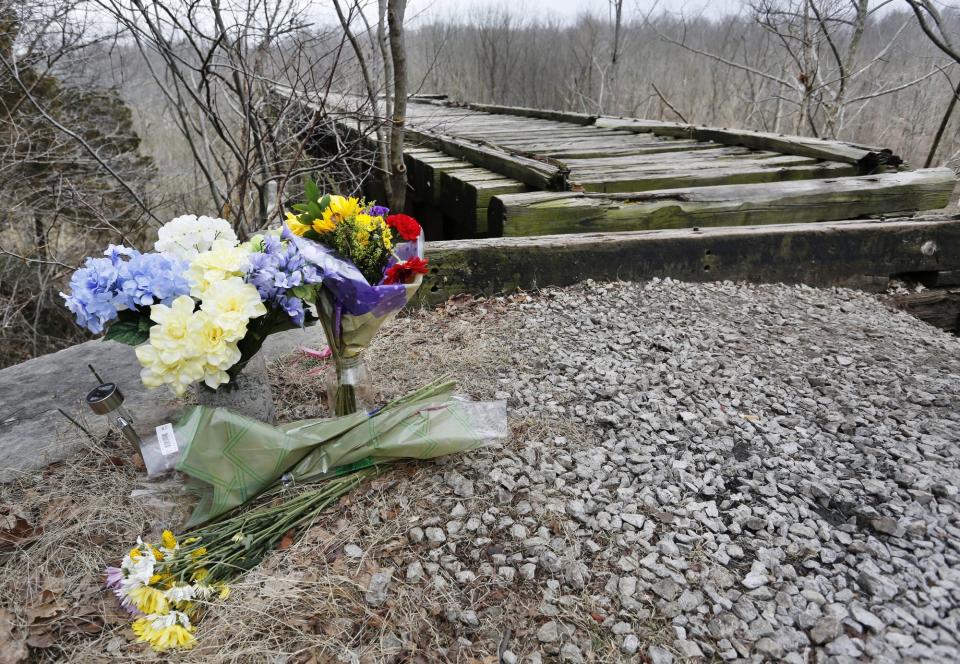
The donnybrook erupted after Allen's court-appointed defense attorneys claimed in September that members of a pagan religion sacrificed the girls during a bloody ritual in the woods ― and police failed to investigate the real killers.
Then, just months before the criminal cases was set to go to trial, a leak of graphic crime scene photos threatened to upend the already high-stakes case. The leak set off a new whirlwind of activity.
A man identified in court documents as being tied to the leak killed himself during the ensuing investigation. The presiding judge removed Allen's defense attorneys, capping off a chaotic October. Then another man was charged in November for his role in the leak.
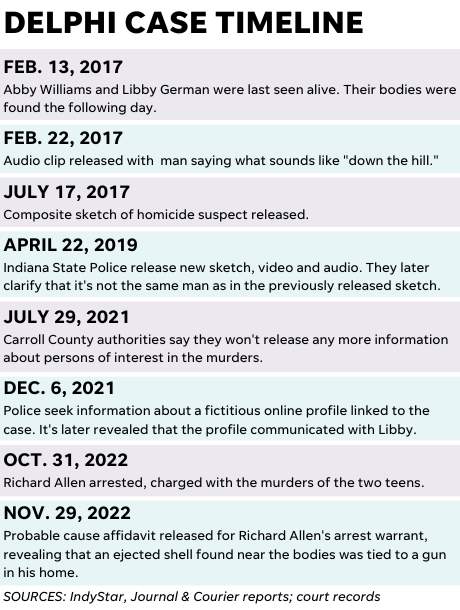
Now, the case has devolved into a messy legal fight in the state's highest court over Allen's request to reinstate his attorneys ― and calls to remove the judge from the case.
Delphi murder suspect Richard Allen: Indiana town wants answers about man who 'blended in'
Legal experts say these controversies, not to mention the toxic online chatter that continues to proliferate, could make it more difficult to find impartial jurors for a trial that has now been pushed back another year. They also have placed the state’s legal system in an unflattering national spotlight and could undermine the public's confidence in the criminal justice process.
"We must cultivate public faith in the integrity of the trial process and integrity of the actors. When defendants become celebrities, that does not happen," said Indiana University law professor Jody Madeira, who’s been following the case and has studied other high-profile prosecutions, including that of Oklahoma City bomber Timothy McVeigh.
"Increased publicity exasperates the public. It lowers the public opinion of the defendant and the defense team. It focuses the media coverage on the defendant instead of the victim. And it tends to undermine the dignity of the proceedings."
Seemingly lost in the hubbub are the most fundamental questions: Will justice for the victims and their families ultimately be served? What about the rights of Allen, at this time a constitutionally innocent man who will have been behind bars for more than two years by the time he faces a jury?
"What the focus needs to be on ultimately are the victims and Richard Allen," said Alice LaCour, an attorney and co-host of The Prosecutors podcast, which has been following the case. "Those are the ... main people who we should be concerned about and who are forgotten throughout all of this."
Legal expert on Delphi case: 'It is an absolute mess'
Carroll County Prosecutor Nicholas McLeland sent an alarming email at around 4 a.m. on Oct. 12. He'd just gotten off the phone with an Indiana State Police officer. A man tied to the leak killed himself the night before, McLeland wrote in the email included in court filings. It was the latest "bizarre" twist in a case that has had its share of twists and turns.
"This is getting serious and way out of control," the prosecutor said in the email to Andrew Baldwin and Bradley Rozzi, Allen's court-appointed attorneys, and Special Judge Frances Gull.
The attorneys learned days earlier that a security breach at Baldwin's office led to the leaking of crime scene images. A friend and former employee, Mitch Westerman, would later be charged after admitting in an affidavit that he had surreptitiously taken pictures of the evidence he found on a conference room table. Westerman had forwarded the photos to the man who later killed himself after being questioned by police.
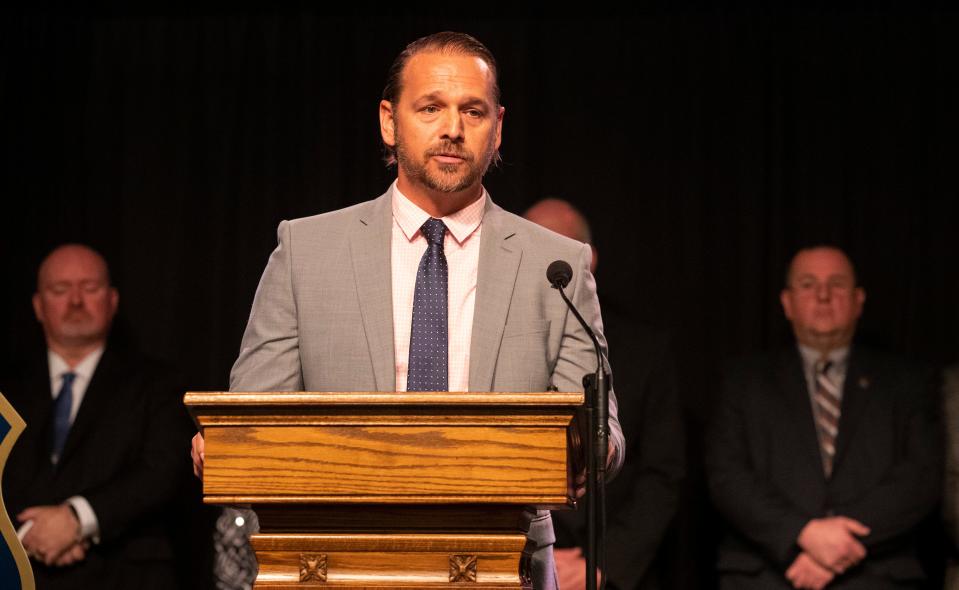
"This is beyond tragic … once again I’m at a loss for words," Gull replied. "I'm deeply concerned that Mr. Allen’s defense is being compromised by all these recent events."
What followed was even more chaos that's changed the trajectory of the case.
"It is an absolute mess," said Madeira, the IU law professor. "This doesn’t really have a precedent."
During an Oct. 19 meeting in her office, Gull made clear that her concerns dated back to almost a year earlier, after Allen was arrested. She enumerated to Baldwin and Rozzi examples of what she saw as problematic conduct that she planned to reveal in court, including: a press release the defense attorneys issued early in the case that included information Gull believe shouldn't have been revealed; an earlier leak after Baldwin accidentally emailed information to someone who's not part of the case; and "inaccuracies and falsehoods" in the attorneys' court filings about the conditions of Allen's incarceration at the Westville Correctional Facility, where he's being held pending trial.
'Like it happened yesterday': Family reflects on Delphi murders at four-year anniversary
"It pains me to say this, but the totality of these circumstances demonstrates gross negligence and incompetence on the part of the defense team," Gull said, according to a meeting transcript. "I am unsatisfied with your representation of Mr. Allen. I am gravely concerned about his rights to have competent, non-negligent representation."
The meeting ended with both attorneys withdrawing from the case. But Rozzi said the judge left them with an impossible choice ― quit or be shamed in front of the public and the media ― and without a chance to refute the allegations.
"You can understand how upset that would make any lawyer ... I don't think it's the right way to handle this from a due process standpoint," Rozzi told the judge.
Baldwin said he agreed, but didn't say much else.
"I'm stunned, I don't know what to say," Baldwin said. Earlier in the meeting, he said, "this is the worst, lowest point of my career right now."
The defense attorneys soon backtracked, and during a contentious hearing on Oct. 31, insisted on staying on at Allen's request ― even as his newly appointed public defenders appeared on his behalf.
Delphi case chaos: Murder suspect's attorney says he will stay on the case; calls for judge to quit
"We didn't act grossly negligent," Rozzi told Gull, according to a transcript of the hearing. Earlier, he filed a motion to disqualify the judge, saying she'd falsely accused them of gross negligence while turning a blind eye on police and prosecutorial misconduct they've uncovered.
Gull asked McLeland to weigh in.
"Judge, I guess I'm at a loss at this point," the prosecutor said, adding later: "I think everything they've done, including the most recent leak, is just an effort by them to push this case out into the public and try this in the public eye and not in this court."
Later, Gull addressed the defendant.
"I cannot and will not allow these attorneys to represent you with the concerns that I’ve had," she told Allen.
By early November, the debacle had spilled into the Indiana Supreme Court, where Allen is asking for his original defense team's reinstatement and Gull's removal. A new set of civil attorneys representing Allen in the high court argued Gull had circumvented proper removal proceedings based on her "subjective" findings of negligence and did so against Allen's wishes.
Baldwin, Rozzi and McLeland all declined to comment.
'Extrajudicial grandstanding' or 'zealous' representation?
Depending on whom you ask or which court document you read, Baldwin and Rozzi are either grandstanders who have inflamed and lied to attract media attention, or dedicated attorneys who have worked tirelessly to defend a client they believe is innocent.
A key part of that defense is an explosive, 136-page document that opened with this: "Members of a pagan Norse religion, called Odinism, hijacked by white nationalists, ritualistically sacrificed Abigail Williams and Liberty German."
The defense attorneys pointed to signs at the crime scene, including branches that were placed over the girls' bodies to form Odinist runes and horns, and a letter painted on a tree allegedly with Libby’s blood. They argued investigators ignored these and other "overwhelming" pieces of evidence pointing to Odinists. They alleged that a parallel investigation by three officers led to other "obvious suspects." But those leading the investigation failed to follow these leads due to "incompetence or a concerted intentionality."
The attorneys also alleged that Allen was "being threatened, intimidated, and mentally abused" by Odinists working as guards at Westville. The facility's acting warden denied the allegations. Two correctional officers admitted in affidavits that they wore patches tied to pagan religion but claimed they don't practice Odinism.
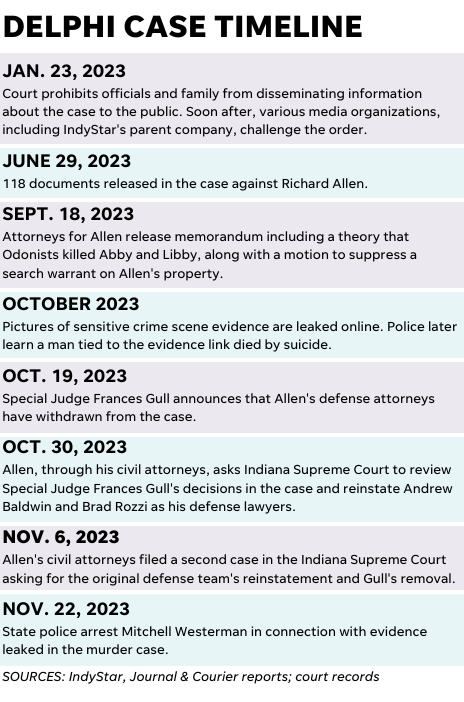
McLeland described the Odinism allegations as "fanciful defense for social media to devour," according to court records. The prosecutor also accused Baldwin and Rozzi of "extrajudicial grandstanding" and using "inflammatory" and "supercilious" language ― even outright lies ― in many of their court filings to generate soundbites.
Odinism allegations: Ritual sacrifice raised in defense of Delphi, Indiana double-murder suspect
Other critics of the defense team, like The Prosecutors podcast hosts, said the attorneys have an uphill battle: Allen admitted being on the trail the same afternoon the girls disappeared. An unspent bullet found near the bodies was forensically tied to a gun Allen owned, according to investigators. And, Allen allegedly confessed to the killings during prison calls with his wife, according to court records.
LaCour said the defense team crafted an alternative narrative for everyone to talk about.
"People are willing to put aside rationality to believe a fantastic story," said Brett Talley, co-host of the podcast. "They need people to set aside rationality and lose themselves in the conspiracy."
Madeira, the IU law professor, said the conduct Gull described during the Oct. 19 meeting "would fall in line" with what's been considered gross negligence in other cases.
Delphi case: Richard Allen's attorneys allege more inconsistencies from investigators
"Attorneys in the past decades have been deemed grossly negligent for failing to meet deadlines of the trial court, denying knowledge of evidence, only producing documents and other evidence after discovery has closed, not giving evidence when they promised they will, failing to attend meetings, misrepresenting the law," Madeira said, citing examples nationwide.
Addressing the leak of crime scene photos, Madeira said there are procedures for handling confidential documents and when they can be revealed to third parties. "You don't leave confidential information unlocked in a conference room," she said.
The attorneys’ defenders argue their actions, including those the judge found to be grossly negligent, all amount to "zealous" advocacy of Allen. And the Odinism allegations are not a false narrative the attorneys made out of thin air, but a theory of the case backed by thousands of pages of documents they received from the prosecution.
Delphi case chaos: Accused Delphi killer's attorneys fight removal from the case
Bob Hammerle, an Indianapolis defense attorney who’s been following the case, said the attorneys were simply doing their job, and they should be allowed to keep doing so.
"To force them to withdraw is the second tragedy in this case," Hammerle said. "The first one being the death of those girls."
Bob Motta, a Chicago defense attorney who also has been following the case and hosts a podcast called Defense Diaries, said none of the conduct Gull enumerated is "even remotely close" to negligence or incompetence.
"This is what it looks like when you have two attorneys that 100% believe with all their hearts that their client is innocent," Motta said. "That is what it looks like. This is how you fight."
Motta also said the attorneys, specifically Baldwin, shouldn't be blamed for the leak.
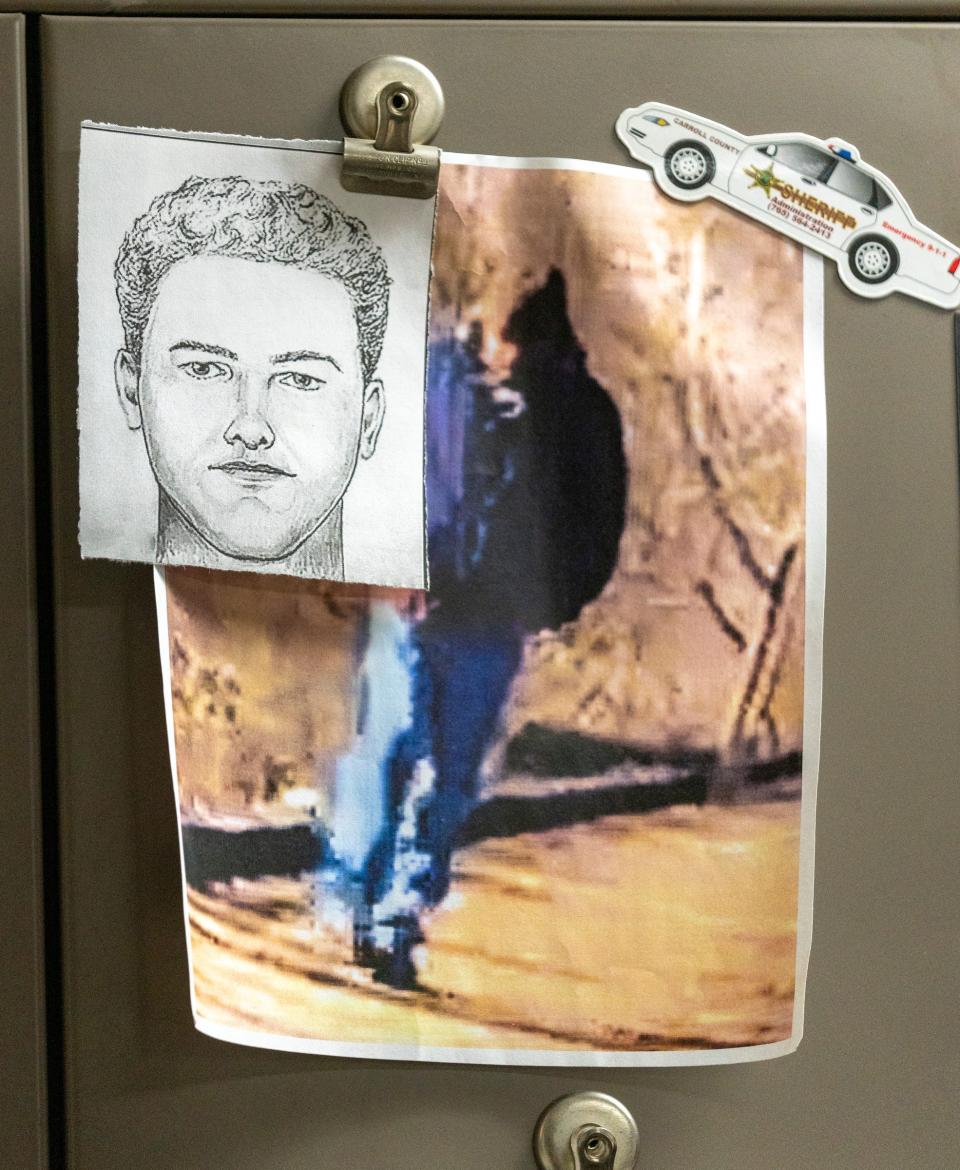
"It's the equivalent of somebody I invited into my house and they snuck up in my bedroom and went into my wife's jewelry box and stole a diamond earring," he said. "And the police blamed me for not having enough security in my house."
Bernice Corley, executive director of the Indiana Public Defender Council, which filed a brief supporting the attorneys' reinstatement, said the situation places the new defense team at a great disadvantage because they have to gain the trust of a defendant who, based on court records, has made it clear which attorneys he prefers.
"When someone is represented by a public defender, it takes time to build trust in that person. Their point of view is, 'You're paid by the government. You don't care what happens to me. You're just here to run me through the plea mill,'" Corley said. "Building trust is the first hurdle, and you cannot represent a person if they don't trust you, if they don't believe you care about their case and you're going to fight for them."
Judge's actions also under scrutiny
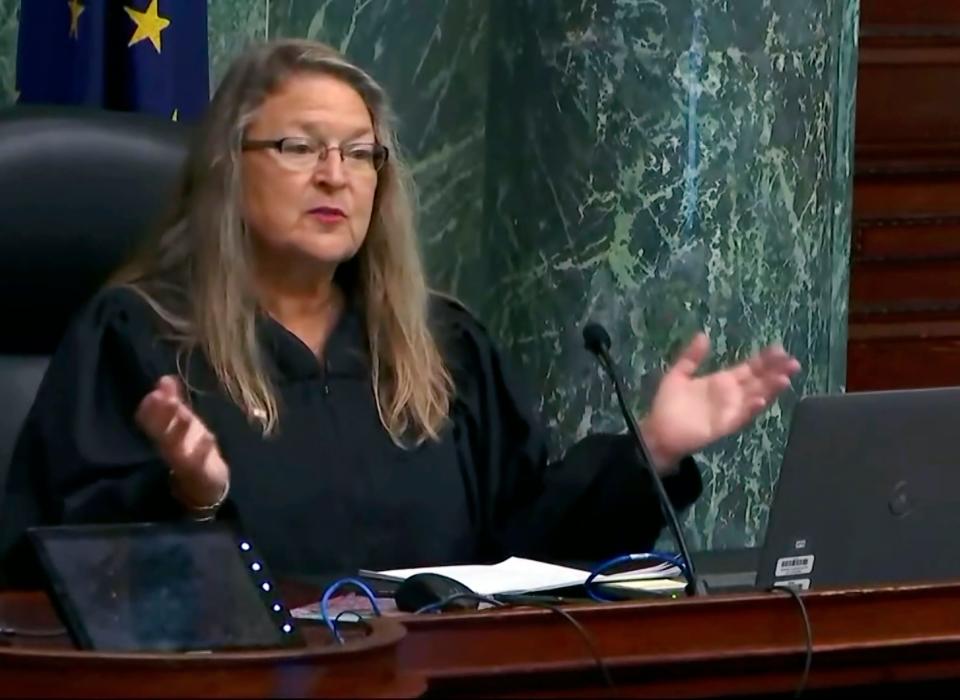
When it comes to Judge Gull, legal experts and others who've been following the case seem just as divided.
Hammerle, the Indianapolis defense attorney, said there's no legal basis to force out Baldwin and Rozzi. And doing so privately, outside the courtroom without the defendant present, "brings a black mark to our judicial process."
"The actions of the trial judge are legally inexcusable," he said. "She is the one that should be removed from this case for her conduct."
Corley also said she's concerned the conversation leading up to the attorneys' withdrawal happened in the judge's chambers and not in open court. In a brief filed by the Indiana Public Defender Council, Corley wrote that Allen and the taxpayers funding his defense deserve "more than vague and broad concerns about 'gross negligence.'"
Dispute in the Indiana Supreme Court: Briefs filed defending judge's decisions in Delphi murder case
Gull, through attorneys representing her in the state Supreme Court, argued she was within her authority to disqualify Baldwin and Rozzi. Their actions compromised Allen's defense and fell short of professional norms, she argued. Gull also denied being biased against the defense, saying a judge's adverse rulings are not enough to show personal prejudice.
"The law is very clear," said LaCour, The Prosecutors podcast co-host. "The judge has the discretion to run her court especially when there's been such a breach of the protective order."
Madeira, the IU law professor, said Gull "tried to police things as best as possible" and realized that Baldwin and Rozzi either had to withdraw or stay on the case. The latter, Madeira said, could risk further leaks.
"I think Judge Gull was weighing and balancing two matters. First is how the evidence got leaked and making sure it doesn't happen again, and making sure you're isolating the source of that leak," Madeira said. "I think she's interested in expediency, and I think she's interested in keeping everything on the down-low as much as possible."
But did her methods backfire?
"Oh, absolutely," Madeira said. "But I don't think it was foreseeable at that time."
Dispute in the Indiana Supreme Court: Judge argues Delphi suspected killer's motion should be denied
In a separate case before the state Supreme Court, Allen's civil attorneys accused Gull of violating rules by improperly excluding documents from public access. Attorneys for several media outlets, including IndyStar, have filed appearances in the case after court documents, including the probable cause affidavit, were under seal for months after Allen was charged.
Gull's attorney, who declined to comment, argued in court records that the issue is moot because dozens of documents have since been made available. An attorney who represents Allen in the civil cases didn't respond to requests for comment.
But critics say the lack of transparency created a vacuum that allowed misinformation to fester.
"When everything has been held under lock and key and been hidden away from the public, it's created this atmosphere where everybody is just left to speculate, and it's dangerous," Motta, the Chicago defense attorney, said.
"This is a perfect example of why cases should not be tried in the shadows."
Delphi case has created a 'bizarre online community'
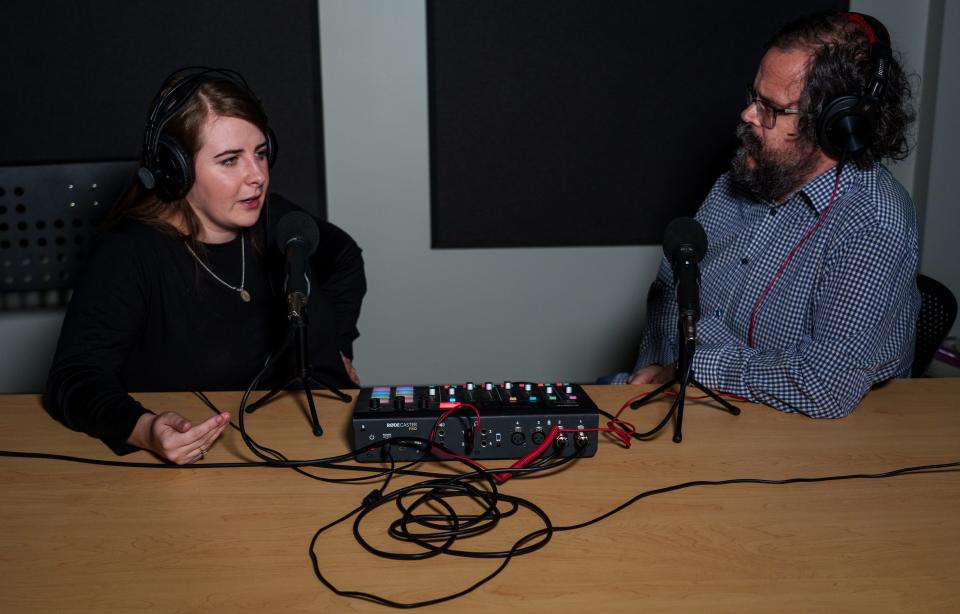
Outside the courtroom, online conversations on countless spaces such as Reddit, Discord, 4chan and various Facebook groups have ranged from thoughtful discussions of the case to unhinged rants and vitriolic speech. Hateful posts on social media have targeted those involved, including Gull and McLeland. Some have disparaged Libby’s family members.
The case has also spawned a cottage industry of content creators and true crime podcasters. Some of them, including podcasters and husband-and-wife team Áine Cain and Kevin Greenlee, received the leaked crime scene photos and have themselves become targets of personal attacks and harassment for their coverage of the case.
The house where Greenlee and Cain live was posted on Discord. A fake account on X, formerly Twitter, also was created to mock and disparage the couple and their popular podcast.
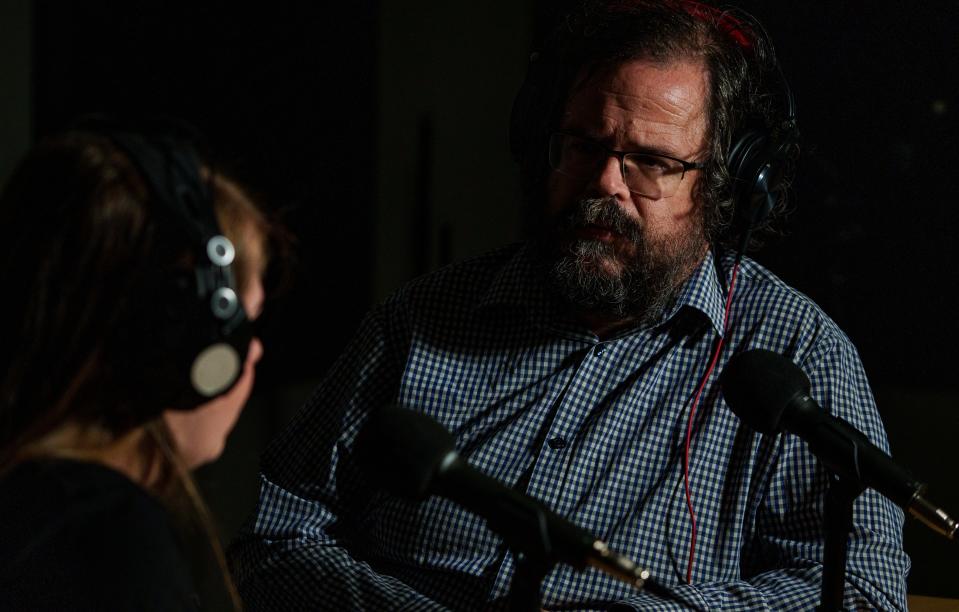
"I don't think people who haven't reported on this case understand how bizarre it is," said Greenlee, an attorney who co-hosts the Murder Sheet podcast with Cain. "It's a bizarre online community."
Cain, a journalist who worked for Business Insider, said the amount of attention the Delphi murders have attracted shows that people want justice for the victims.
"I think there is a very dark side to all of this, though," she said. "You have people who don’t necessarily have a great sense of boundaries or their own failings or biases or lack of experience who essentially attempt to control the case, control the narrative by spreading conspiracy theories, by spreading rumors, by spreading what I would characterize as very irresponsible conjecture."
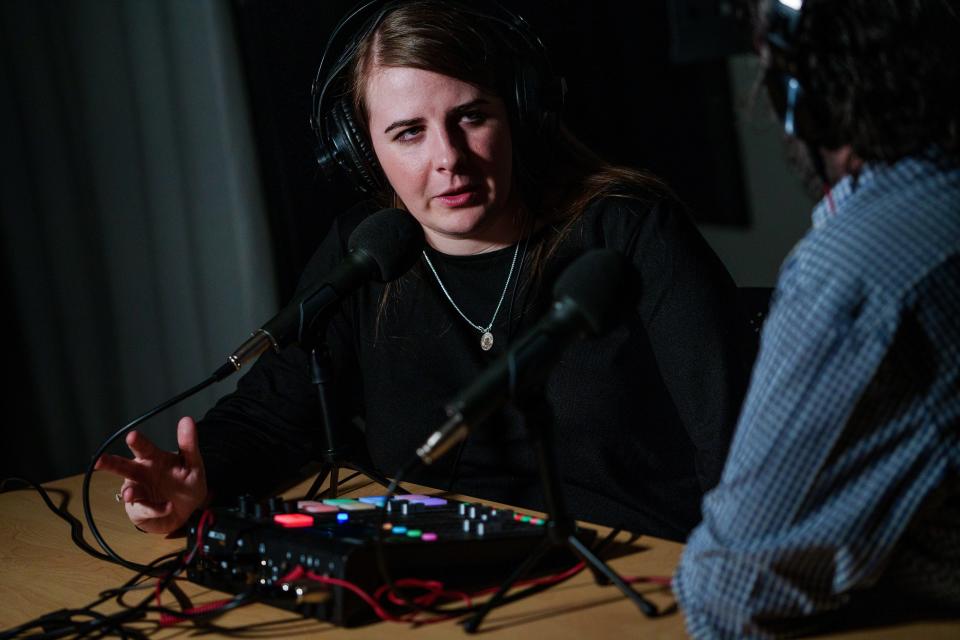
In the meantime, the two civil cases filed in the state Supreme Court are pending. Allen's criminal trial is scheduled to start in October 2024, almost exactly two years after he was arrested.
This delay furthers the victims' agony, Cain said, and lengthens an already painful process.
"Essentially the case entering a judicial phase should've been a moment where they can watch the system work, engender transparency and progress in the case," Cain said. "Unfortunately, that has not happened."
Ron Wilkins of the Lafayette Journal & Courier contributed to this story. Contact IndyStar reporter Kristine Phillips at (317) 444-3026 or at kphillips@indystar.com.
This article originally appeared on Indianapolis Star: Delphi murders: Richard Allen case sets spotlight on Indiana system

